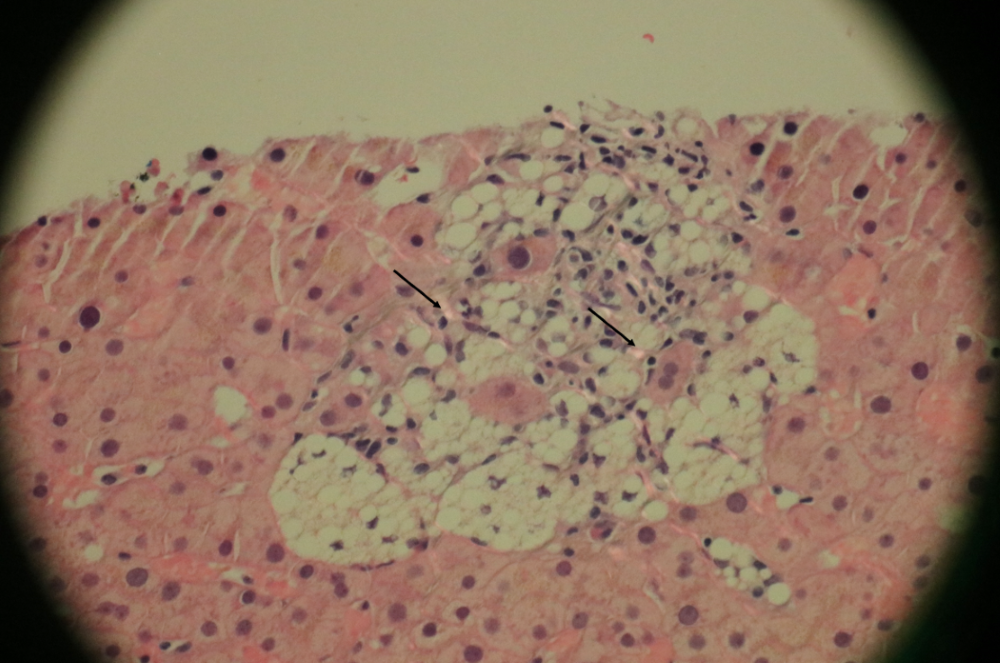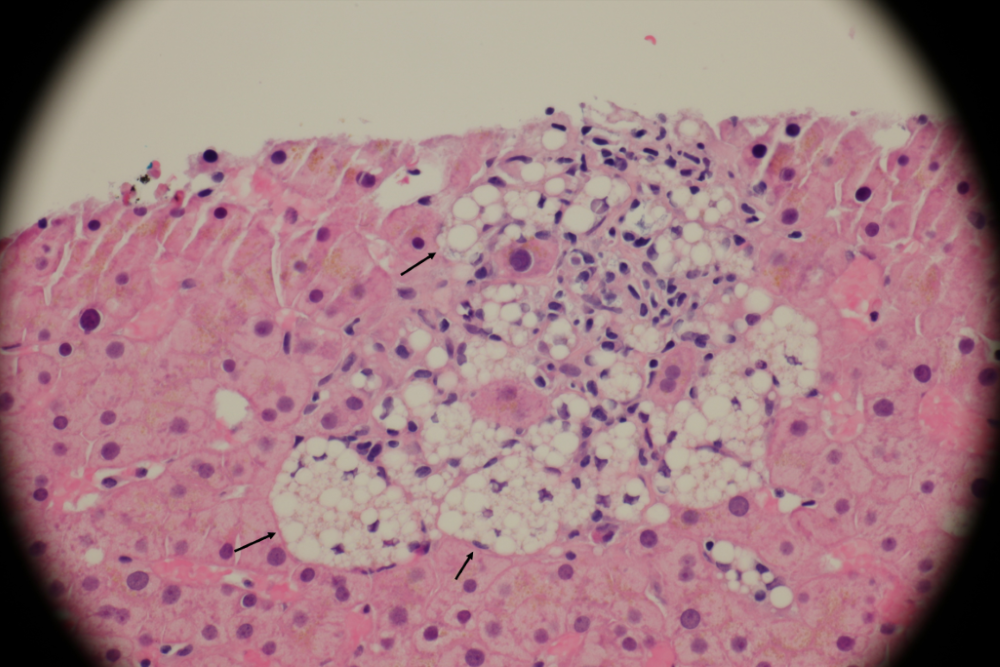Sunday Poster Session
Category: Liver
P1847 - Ruptured Silicone Breast Implants as Rare Causes of Hepatic Granulomas
Sunday, October 26, 2025
3:30 PM - 7:00 PM PDT
Location: Exhibit Hall

Laura DiBenedetto, DO
New York University Langone Health
Astoria, NY
Presenting Author(s)
Laura DiBenedetto, DO1, Vincent Wong, MD2, Naunihal Singh, DO3, Stephanie Ren, MD2, Bilal Asif, MD4, Xiaofei Zhang, MD, PhD2
1New York University Langone Health, Astoria, NY; 2NYU Langone Health, Mineola, NY; 3New York University Langone Health, West Hempstead, NY; 4NYU Langone, Mineola, NY
Introduction: Hepatic granulomas are clusters of inflammatory cells that can be seen in approximately 15% of patients. They can be caused by varied infections, autoimmune (sarcoidosis), primary biliary cirrhosis, medications, foreign materials, or may be idiopathic. Patients can be asymptomatic in which case granulomas are incidentally found, or present with elevated liver enzymes. There have only been several case reports in the literature describing silicone as causes for granulomatous reactions in the liver. We report an asymptomatic patient who had ruptured breast implants and was found with hepatic silicone granulomas.
Case Description/
Methods: A 62-year old female with a history of breast cancer with bilateral breast mastectomies and reconstruction, presented to the clinic for elevated liver enzymes. A year prior, she had bilateral silicone implant rupture with lymphadenopathy, for which they were removed. She had no abdominal pain, jaundice or pruritus, but was found with right axillary swelling. Initial labs showed AST 94 U/L, ALT 106 U/L, Alk Phos 96 U/L, TBili 0.4 mg/dL. Breast magnetic resonance imaging (MRI) revealed several benign T2 hyperintense hepatic lesions. Hepatitis, autoimmune and infectious serologies were within normal. An MRI of the liver showed benign liver hemangiomas and a normal liver stiffness without steatosis or iron overload. She then underwent a liver biopsy which revealed multiple multinucleated giant cells containing clear vacuoles and asteroid bodies, consistent with silicone granulomas. On follow-up nine months later, her liver enzymes returned to normal.
Discussion: Silicone from ruptured breast implants can travel to other organ systems in the body such as the gastrointestinal tract, liver, and nervous system. The pathophysiology is not completely understood but hypothesized to involve T-cell activation leading to increases in proinflammatory cytokines. The diagnosis can only be made on liver biopsy after ruling out common etiologies, showing chronic active hepatitis with nodular fibrosis and giant cell granulomas containing clear vacuoles. There is no definitive treatment for silicone granulomas besides pain control. Due to the increasing number of breast implant surgeries performed, gastroenterologists should be aware of silicone in ruptured implants causing hepatic granulomas and elevations in liver enzymes. More research should be done to determine their long term clinical implications.

Figure: Multiloculated silicone containing macrophages

Figure: Refractile silicone material under polarized light
Disclosures:
Laura DiBenedetto indicated no relevant financial relationships.
Vincent Wong indicated no relevant financial relationships.
Naunihal Singh indicated no relevant financial relationships.
Stephanie Ren indicated no relevant financial relationships.
Bilal Asif indicated no relevant financial relationships.
Xiaofei Zhang indicated no relevant financial relationships.
Laura DiBenedetto, DO1, Vincent Wong, MD2, Naunihal Singh, DO3, Stephanie Ren, MD2, Bilal Asif, MD4, Xiaofei Zhang, MD, PhD2. P1847 - Ruptured Silicone Breast Implants as Rare Causes of Hepatic Granulomas, ACG 2025 Annual Scientific Meeting Abstracts. Phoenix, AZ: American College of Gastroenterology.
1New York University Langone Health, Astoria, NY; 2NYU Langone Health, Mineola, NY; 3New York University Langone Health, West Hempstead, NY; 4NYU Langone, Mineola, NY
Introduction: Hepatic granulomas are clusters of inflammatory cells that can be seen in approximately 15% of patients. They can be caused by varied infections, autoimmune (sarcoidosis), primary biliary cirrhosis, medications, foreign materials, or may be idiopathic. Patients can be asymptomatic in which case granulomas are incidentally found, or present with elevated liver enzymes. There have only been several case reports in the literature describing silicone as causes for granulomatous reactions in the liver. We report an asymptomatic patient who had ruptured breast implants and was found with hepatic silicone granulomas.
Case Description/
Methods: A 62-year old female with a history of breast cancer with bilateral breast mastectomies and reconstruction, presented to the clinic for elevated liver enzymes. A year prior, she had bilateral silicone implant rupture with lymphadenopathy, for which they were removed. She had no abdominal pain, jaundice or pruritus, but was found with right axillary swelling. Initial labs showed AST 94 U/L, ALT 106 U/L, Alk Phos 96 U/L, TBili 0.4 mg/dL. Breast magnetic resonance imaging (MRI) revealed several benign T2 hyperintense hepatic lesions. Hepatitis, autoimmune and infectious serologies were within normal. An MRI of the liver showed benign liver hemangiomas and a normal liver stiffness without steatosis or iron overload. She then underwent a liver biopsy which revealed multiple multinucleated giant cells containing clear vacuoles and asteroid bodies, consistent with silicone granulomas. On follow-up nine months later, her liver enzymes returned to normal.
Discussion: Silicone from ruptured breast implants can travel to other organ systems in the body such as the gastrointestinal tract, liver, and nervous system. The pathophysiology is not completely understood but hypothesized to involve T-cell activation leading to increases in proinflammatory cytokines. The diagnosis can only be made on liver biopsy after ruling out common etiologies, showing chronic active hepatitis with nodular fibrosis and giant cell granulomas containing clear vacuoles. There is no definitive treatment for silicone granulomas besides pain control. Due to the increasing number of breast implant surgeries performed, gastroenterologists should be aware of silicone in ruptured implants causing hepatic granulomas and elevations in liver enzymes. More research should be done to determine their long term clinical implications.

Figure: Multiloculated silicone containing macrophages

Figure: Refractile silicone material under polarized light
Disclosures:
Laura DiBenedetto indicated no relevant financial relationships.
Vincent Wong indicated no relevant financial relationships.
Naunihal Singh indicated no relevant financial relationships.
Stephanie Ren indicated no relevant financial relationships.
Bilal Asif indicated no relevant financial relationships.
Xiaofei Zhang indicated no relevant financial relationships.
Laura DiBenedetto, DO1, Vincent Wong, MD2, Naunihal Singh, DO3, Stephanie Ren, MD2, Bilal Asif, MD4, Xiaofei Zhang, MD, PhD2. P1847 - Ruptured Silicone Breast Implants as Rare Causes of Hepatic Granulomas, ACG 2025 Annual Scientific Meeting Abstracts. Phoenix, AZ: American College of Gastroenterology.
